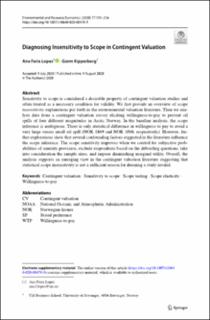Diagnosing Insensitivity to Scope in Contingent Valuation
Peer reviewed, Journal article
Published version
Permanent lenke
https://hdl.handle.net/11250/3050482Utgivelsesdato
2020-08Metadata
Vis full innførselSamlinger
Originalversjon
Faria Lopes, A., Kipperberg, G. (2020) Diagnosing Insensitivity to Scope in Contingent Valuation. Environmental and Resource Economics, 77, 191-216. 10.1007/s10640-020-00470-9Sammendrag
Sensitivity to scope is considered a desirable property of contingent valuation studies and often treated as a necessary condition for validity. We first provide an overview of scope insensitivity explanations put forth in the environmental valuation literature. Then we analyze data from a contingent valuation survey eliciting willingness-to-pay to prevent oil spills of four different magnitudes in Arctic Norway. In the baseline analysis, the scope inference is ambiguous. There is only statistical difference in willingness to pay to avoid a very large versus small oil spill (NOK 1869 and NOK 1086, respectively). However, further explorations show that several confounding factors suggested in the literature influence the scope inference. The scope sensitivity improves when we control for subjective probabilities of amenity provision, exclude respondents based on the debriefing questions, take into consideration the sample sizes, and impose diminishing marginal utility. Overall, the analysis supports an emerging view in the contingent valuation literature suggesting that statistical scope insensitivity is not a sufficient reason for deeming a study invalid.

